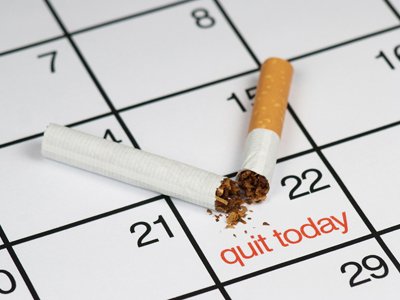Kicking the smoking habit is extremely difficult. The numbers speak for themselves, as an American Lung Association survey discovered that 60 percent of smokers were unsuccessful at quitting on their first try.1 “Most Smokers Make Multiple Quit Attempts Before They Quit Smoking for Good.” American Lung Association. 30 September 2009. Accessed 14 January 2015. http://www.lung.org/press-room/press-releases/lung-assn-launches-quitter-in-you.html And if you are a woman, giving up cigarettes might be even more challenging. According to new research, for women, the likelihood of accomplishing the task may vary quite a bit depending on the time of month you decide to start abstaining from cigarettes.
The study, which was conducted at the Institut Universitaire en Sante Mentale de Montreal in Canada, found that a woman’s menstrual cycle may significantly affect her ability to withstand cigarette cravings, making certain times of the month much better suited for sticking with a plan to quit.2 Sifferlin, Alexandra. “How Your Period Affects Your Desire to Quit Smoking.” Time. 6 January 2015. Accessed 14 January 2015. http://time.com/3655931/how-your-period-affects-your-desire-to-quit-smoking/. The subjects were 19 women and 15 men who regularly smoked more than 15 cigarettes daily. Each individual answered a questionnaire regarding the strength of their desire for a cigarette and the women an extra one on their menstrual history. MRI scans were taken of their brains as they viewed images associated with smoking.
The imaging procedures were performed twice on the female participants in order to determine any differences that might occur depending on the phase of their menstrual cycle. So, following a blood test to check hormone levels, the women had one MRI early in the follicular phase, which begins the first day of menstruation and lasts until ovulation, and another during the mid-luteal phase, which runs from the start of ovulation through the first day of the next cycle. By choosing the midpoint of this phase, ovulation is over and both estrogen and progesterone levels are elevated to thicken the lining of the uterus.
Disparities in cigarette cravings were minimal between the male and female volunteers in general. But in the women alone, substantial differences were found in brain activity depending on what point they were at in their cycle. The scans showed that the women had far greater neural activity in areas of the brain associated with cravings during the follicular phase. The imaging performed while the women were in that phase indicated a measurable jump within the frontal, temporal, and parietal lobes, which encompass a large portion of the brain. In contrast, the imaging performed while the women were in the mid-luteal phase only showed an upswing in activity within the right hippocampus, which mainly plays a role in memory. The researchers suggested that hormonal decreases during the follicular portion of the cycle may contribute to a stronger desire to smoke.
The findings do appear to be in line with previous research regarding gender and the ability to quit smoking. A 2006 study at the Centers for Disease Control and Prevention found that women often become addicted to cigarettes faster than men and are more frequently unable to give up the habit.3 “Tobacco use among adults–United States, 2005.” Morbidity and Mortality Weekly Report. 27 October 2006. Accessed 15 January 2015. http://www.ncbi.nlm.nih.gov/pubmed/17065979 However, the current experiment was extremely small so the outcomes are not thoroughly convincing. If it were replicated with a much larger population sample, it would offer more compelling evidence. It would also be interesting to note what differences occur in post-menopausal women because if the lower levels of hormones are in fact responsible in part for greater cigarette cravings, then it would stand to reason that women no longer menstruating would have a tougher time quitting smoking in general.
At any rate, since we do know that hormones have a significant influence on lots of our bodily systems, it certainly could be possible that they impact our desire to smoke and therefore how difficult it is to quit. The first two weeks are typically the hardest time for quitters as the body experiences nicotine withdrawal symptoms along with psychological adjustments. But quitting is a very worthwhile pursuit since smoking is a contributing factor in heart disease, stroke, certain cancers, and even dementia. So women, you might want to time your quitting efforts carefully to the mid-luteal phase of your cycle and throw away those cigarettes just after you ovulate (if you’re regular enough to know). Anything that could increase your chances of successful quitting is certainly worth a try.
References
| ↑1 | “Most Smokers Make Multiple Quit Attempts Before They Quit Smoking for Good.” American Lung Association. 30 September 2009. Accessed 14 January 2015. http://www.lung.org/press-room/press-releases/lung-assn-launches-quitter-in-you.html |
|---|---|
| ↑2 | Sifferlin, Alexandra. “How Your Period Affects Your Desire to Quit Smoking.” Time. 6 January 2015. Accessed 14 January 2015. http://time.com/3655931/how-your-period-affects-your-desire-to-quit-smoking/. |
| ↑3 | “Tobacco use among adults–United States, 2005.” Morbidity and Mortality Weekly Report. 27 October 2006. Accessed 15 January 2015. http://www.ncbi.nlm.nih.gov/pubmed/17065979 |











